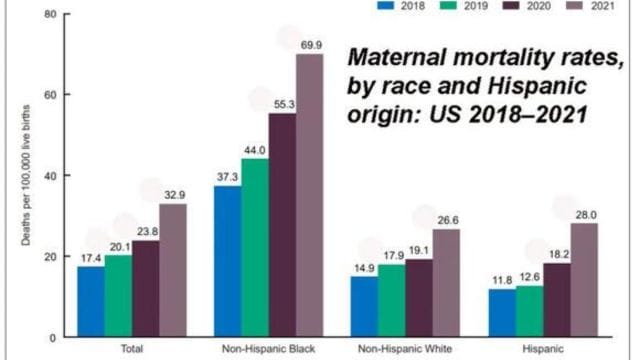Tori Bowie, a former world’s fastest woman, and three-time Olympic medalist, sadly passed away at the age of 32. Recent news has revealed that her death was a result of complications during childbirth while she was eight months pregnant.
The Associate Medical Examiner suggested that respiratory distress and eclampsia, a condition related to high blood pressure during pregnancy, might have contributed to her untimely demise.
This incident serves as a reminder of the alarming rates of maternal death, particularly among Black and brown women, not only in Florida where Bowie passed away but also in Connecticut.
According to the Centers for Disease Control and Prevention (CDC), there were 1,205 maternal deaths in the United States during pregnancy, delivery, or shortly after in 2021. Non-Hispanic Black women faced mortality rates 2.6 times higher than those of white women.
These rates significantly increased during the COVID-19 pandemic, with 2021 rates nearly 40% higher than the previous year. Black women experienced the highest increase, with a mortality rate of nearly 70 deaths per 100,000 births, up from approximately 55 in 2020.
Despite the frequency of maternal deaths, our understanding of the underlying causes remains limited. To address this issue, states have received millions of dollars from the federal government to investigate these deaths.
A 2022 CDC report revealed that a staggering 84% of these deaths are preventable, with mental health conditions, hemorrhage, cardiac and coronary conditions, infection, thrombotic embolism, and cardiomyopathy identified as the primary underlying causes.
While mental health problems are the most common cause overall, they are more prevalent among Hispanic and non-Hispanic white women, while Black women are more likely to die from cardiac and coronary conditions. These disparities worsen with age and are not influenced by education levels.
Connecticut, often seen as a state providing excellent care for pregnant and parenting individuals, also struggles with maternal death. The Connecticut Department of Public Health’s Maternal Mortality Review Program found that the state’s pregnancy-related mortality ratio between 2015 and 2019 was 14.2 deaths per 100,000 live births, higher than the national rate.
Similar to national trends, Black women in Connecticut faced higher mortality rates than white women. Shockingly, the Maternal Mortality Review Committee determined that 88% of pregnancy-related deaths in Connecticut were preventable.
Structural factors, including income inequality and limited access to healthy food and medication in approximately 10% of Connecticut’s neighborhoods, contributed to these disparities.
Southern Connecticut State University (SCSU) has the potential to effectively address these issues. The Sociology and Criminology Department at SCSU examines core issues such as racism, implicit bias, and the relationship between gender and poverty.
Taking a structural perspective, they emphasize how public policy changes, such as improving healthcare coverage, providing transportation, and ensuring adequate housing, can tackle the dangers faced by Black women during childbirth.
SCSU’s Department of Public Health also focuses on understanding and resolving the impact of social determinants of health on maternal health inequities. Factors such as race and ethnicity, education, and access to prenatal care significantly contribute to maternal deaths.
These determinants, categorized into economic stability, education access and quality, healthcare access and quality, neighborhood and built environment, and social and community context, have a profound effect on people’s health and well-being.
By addressing these social determinants of health, including safe housing, transportation, neighborhoods, racism, discrimination, education, job opportunities, income, access to nutritious food, physical activity, polluted environments, and language and literacy skills, Connecticut can work towards preventing further loss of lives due to preventable causes. SCSU is committed to tackling these inequities through research, teaching, and advocacy, striving to create a stronger, more compassionate, and more ethical state.
With collective efforts, Connecticut can prevent tragedies like the passing of Tori Bowie and provide a safer environment for all pregnant individuals.












Leave a Reply